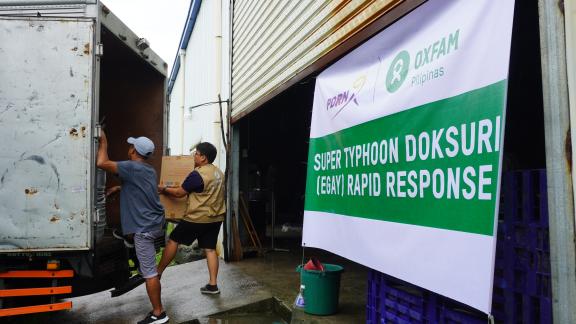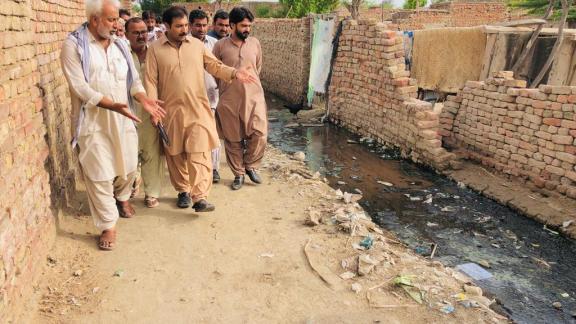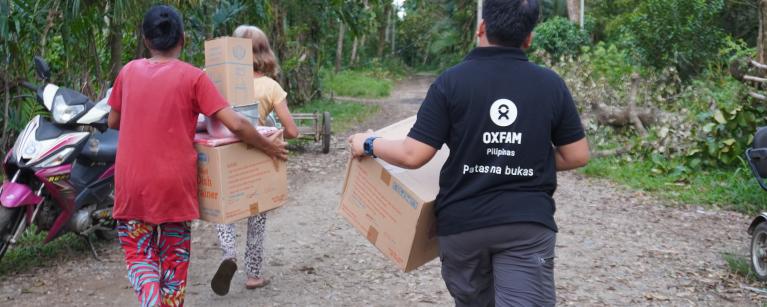Behind every humanitarian aid worker is a story that defies clichés – a world of logistics, paperwork, and unrelenting dedication hidden beneath the surface
To shed light on the remarkable endeavours within the humanitarian sector, Oxfam in Asia connected with dedicated aid workers throughout Asia. Their first-hand narratives offer a compelling glimpse into the dynamic world of crisis response, painting vivid portraits of resilience in action and illuminating the driving forces behind their unwavering commitment to their mission.
PHILLIPPINES

Oxfam Pilipinas
“A lesser-known fact of being an aid worker is that it is emotionally draining, as we are many times the first to reach the field and witness the scale of the devastation. The weight of this responsibility can indeed present significant challenges.”
At the heart of Oxfam Pilipinas' dynamic emergency response team stands Julie Ann Durana, a pivotal force as the Humanitarian Portfolio Officer. With a profound dedication to humanitarian efforts, Julie Ann plays a crucial role in orchestrating swift and effective responses to crises.
Becoming a humanitarian worker wasn't initially my choice, but upon commencing my work within the community, I found the motivation to embrace this career path. There was a particular instance when an individual approached me and conveyed, "We truly value the effort you put in and your approach to our community. Engaging in a simple conversation is something we cherish and truly require during these challenging times."
My association with Oxfam began in 2015 as a data collector or field enumerator during the Typhoon Ruby Response. That same year, I took on the roles of database assistant and project assistant. Currently, I hold the position of Humanitarian Portfolio Officer. In this capacity, I provide technical support for various endeavours including digital registration for humanitarian cash programming and financial inclusion, rapid needs assessment, market assessment, and collaboration with Oxfam's humanitarian partner for cash and market initiatives. I am also a vital part of the emergency response team.
During the aftermath of Super Typhoon Doksuri (locally known as Egay), I was deeply moved by the stories shared by the community. Witnessing the complete devastation of their homes and livelihoods due to the typhoon was emotionally draining. As a member of the emergency response team, we worked tirelessly alongside our local partner, People’s Disaster Risk Reduction Network, Inc. (PDRRN), to ensure the swift distribution of aid.
Our team consistently coordinated efforts with partners, organizations, and affected communities. We actively sought funding support to address their urgent needs.
A lesser-known fact of being an aid worker is that it is emotionally draining, as we are many times the first to reach the field and witness the scale of the devastation. The weight of this responsibility can indeed present significant challenges.
Common misconceptions about humanitarian workers include thinking that they only provide immediate relief or are always on the field working directly with the most affected communities, but in reality, there are other roles like logistics, finance, communications, and others.
Another is they also think that humanitarian workers have high salaries, but the tasks and efforts of the staff are much bigger in reality.
We conducted community orientations to improve the knowledge of people on using e-Wallet features and the associated benefits within our cash programming. It has proven impactful. In response to their feedback, participants have not only been able to enhance their savings for daily needs but have also gained resilience in the face of disasters. This has brought a sense of dignity, particularly evident when they make purchases using the physical card.
PAKISTAN

Response to floods in Pakistan
“Despite the challenges, I wholeheartedly endorse this career path to young people. Humanitarian work demands unwavering compassion, resilience, and dedication, yet the power to transform lives and restore hope is immeasurable. ”
Meet Mustafa Hassan, the Head of Programs at SAFWCO. In the wake of devastating floods in Pakistan, Mustafa shares his journey to serve communities without discrimination that led him from the path of Telecommunication Engineering to the forefront of humanitarian work.
In 2010, a catastrophic flood struck Pakistan, leaving communities in ruins and homes submerged. Witnessing the altruistic endeavours of humanitarian workers providing aid without bias deeply touched me. Although I was initially a Telecommunication Engineer, I embarked on a journey with the Sindh Agricultural Forestry Workers & Coordinating Organization (SAFWCO), starting as a volunteer to assist those affected by the flood. This marked the inception of my 13-year tenure in the humanitarian sector, where I now hold the position of Head of Programs at SAFWCO. My responsibilities encompass crafting and spearheading humanitarian initiatives, conducting needs assessments, and ensuring responses driven by the community.
Recent floods wreaked havoc on our project zones, leaving stagnant water for more than eight months. This inundation devastated homes, disrupted agriculture, and shattered livelihoods. Daily wage labourers, small-scale farmers, and marginalised communities bore the brunt of severe hardships. Scarcity of clean water and proper sanitation further exacerbated their vulnerabilities. Under Oxfam's Partner-led early recovery initiative, "Building Resilience of Flood-Affected Communities," SAFWCO's efforts are concentrated on urgent requisites—water, sanitation, food security, and protection—to aid their recovery.
The majority of communities in our project region consist of daily wage earners, small-scale farmers, livestock caretakers, humble vendors, and determined cart-pullers—within them, a community of the impoverished and extremely destitute. Amidst this landscape, the harshest blows of flooding disproportionately affect those without access to clean drinking water, sanitation facilities, and crucial WASH resources. Within these vulnerable ranks, minority groups face an even more daunting struggle. The absence of drinking water and tools for its collection magnifies their challenges, leading to heightened demands on their time, energy, and resources. Financial limitations leave them waiting for their turn at water sources, often trailing behind women from more fortunate households. Flood-induced damage has incapacitated numerous water sources, compelling women and children to trek to distant areas for water, sacrificing both privacy and safety.
Embodied by the fundamental principles of "equality, humanity, and peace," my role in humanitarian response has guided me to engage with diverse communities spanning three provinces of Pakistan—Sindh, Punjab, and Balochistan. Within these villages and localities, I've brought together various ethnic groups under our shared ideals, nurturing a collective comprehension of disaster preparedness. Despite internal challenges that may arise within these locales, our approach involves establishing "village community organisations." This strategic framework aligns all community members with a unified mission—to protect the lives and livelihoods of each resident. As a result, our combined efforts enhance coordination and empower communities to address internal issues through the lens of humanitarian response.
My tenure in humanitarian response has indelibly imprinted the stark realities faced by communities during climate crises, particularly floods. In such trying moments, people often resort to negative coping mechanisms—liquidating assets, accumulating more debt, skipping meals, and even making difficult choices like early marriages and child labour. Heartrendingly, children are pulled out of schools. Vulnerabilities escalate, particularly for women, children, people with disabilities, the elderly, and marginalised groups.
Motivated by an innate sense of community service, I encouraged my family to contribute to assisting the affected communities. I implored my two sisters, who are doctors, to organize free medical camps for men, women, children, and people with disabilities in flood-affected regions. This support extended to diverse ethnic groups, where they provided free medical checkups and dispensed free medications to patients.
My experiences have illuminated the profound impact of humanitarian work, inspiring me to instil this ethos within my own family. Despite the challenges, I wholeheartedly endorse this career path to young minds. Humanitarian work demands unwavering compassion, resilience, and dedication, yet the power to transform lives and restore hope is immeasurable.
INDIA

Oxfam in India's response to the Odisha train tragedy
“One silver lining in this otherwise grim situation was the camaraderie that developed among fellow responders from various organizations. In times of crisis, a sense of unity emerged, and a supportive network formed.”
Amalin Patnaik, Programme Coordinator at Oxfam in India, shares the lesser-known facets of humanitarian work and his experiences providing aid to victims and families after the tragic train collision in Balasore, Odisha.
Choosing a career in the humanitarian sector has not only given me a profound sense of purpose and satisfaction, but it has also enabled me to play a part in a greater mission beyond my own self. The challenges and ever-changing nature of this work have opened doors for personal development, honing my skills, and embracing a journey of constant learning.
Throughout my career, I've had the privilege of being involved in an array of humanitarian assistance initiatives in India. From extending a helping hand to the Bihar government during the harrowing Koshi floods to taking the lead in UNHabitat's tireless efforts following the devastating floods in Kerala. I was part of the first of kind CBDP (Community Based Disaster Preparedness) programme as Project Officer of UNDP and contributed to the formation of India’s first State Disaster Management Authority and the first Emergency Operations Centre of the country in the District Collectorates of Kendrapada and Sambalpur of Odisha.
In June 2023, the triple train tragedy in Odisha that killed over 290 people tested my limits as a humanitarian worker in ways I never could have imagined. Witnessing the aftermath of a disaster which took hundreds of lives was profoundly moving. It was impossible not to feel a whirlwind of emotions – grief, sadness, empathy, and a sense of helplessness. The weight of the situation was immense, and it made our work even more significant.
One of the first hurdles I faced was securing government permission for setting up a Help Desk. It might sound like a straightforward task, but negotiating with local police, district authorities, and the District Emergency Officer proved to be an intricate dance of diplomacy and persistence. Hours of discussions, numerous phone calls, and countless meetings were necessary to gain the green light. The goal was clear: streamline aid efforts and prevent the duplication of resources among different agencies. It was a testament to Oxfam India's commitment to effective relief work and eliminating redundancy.
A critical aspect of our response was the deployment of trained counselors for psycho-social support. Amidst the chaos, it was essential to provide emotional aid to the grievously injured, their attendants, and families desperately searching for their loved ones. These counselors became pillars of strength, offering comfort and a listening ear to those who had lost so much.
One silver lining in this otherwise grim situation was the camaraderie that developed among fellow responders from various organizations. In times of crisis, a sense of unity emerged, and a supportive network formed. We all knew that we were in this together, and that solidarity was a driving force behind our efforts.
In a world where even a small act of kindness is instantly shared on social media for views and likes, being a humanitarian aid worker goes far beyond fleeting gestures. It involves deeply respecting those in need, seeking their consent, and holding oneself and others accountable. When we engage with communities, our approach ensures that no one is photographed or approached without their consent, preserving their dignity as a priority. Our commitment spans years of collaboration with people and local leaders, fostering trust and understanding.
Cultural sensitivity and adaptability stand as indispensable qualities for aid workers. This involves not only comprehending local customs but also mastering the language. While others might overlook disaster-stricken communities, we invest time in building the capacities of individuals in climate-vulnerable or conflict-affected regions. We tirelessly strive to capture the attention of the international system, aiming for sustainable solutions.
Yet, our responsibilities stretch beyond the frontline. Considerable time is invested in administrative tasks, logistics, and paperwork. This entails seamless collaboration with local authorities, astute budget management, meticulous transport coordination, and compliance with regulations. Our work embodies a holistic commitment, far removed from mere media snapshots of goodwill.
I choose not to place myself at the center of the narrative, for the true focus should always remain on the individuals compelled to dwell in camps and rely on aid for their next meal. Unfortunately, the reality we face demands that more individuals join the ranks of the aid sector, especially considering the escalating climate crisis.
As I reflect on these thoughts, the strength of the human spirit becomes even more evident to me. The tragic events of the Odisha triple train collision serve as a reminder of life's fragility and the importance of collective action.
